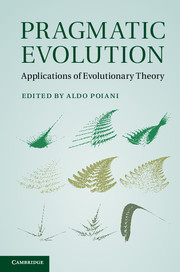Book contents
- Frontmatter
- Contents
- Contributors
- Acknowledgements
- Preface
- Introduction
- Part I Evolution, Ecology and Conservation
- Part II Evolution and Food Production
- Part III Evolution and Medicine
- Part IV Evolution and Psychology
- Part V Evolution and Computing
- Part VI Evolution and Society
- Index
- Plate Section
- References
Introduction
Published online by Cambridge University Press: 05 April 2012
- Frontmatter
- Contents
- Contributors
- Acknowledgements
- Preface
- Introduction
- Part I Evolution, Ecology and Conservation
- Part II Evolution and Food Production
- Part III Evolution and Medicine
- Part IV Evolution and Psychology
- Part V Evolution and Computing
- Part VI Evolution and Society
- Index
- Plate Section
- References
Summary
In the early 1930s, Julian Huxley, the prominent English evolutionary biologist, embarked on a visit across many British science laboratories to understand in which way the scientific knowledge they were producing was socially relevant. His account of this journey, published in 1934 (Huxley, 1934), is a compendium of applied scientific research in engineering, medicine, agriculture and so forth. In the final chapter of the book, a conversation with Hyman Levy (a physicist and mathematician, also a person concerned about the use of science for the good of all, not just a few), Huxley remarks that back then – as is also true now – the advancement of scientific knowledge was limited by funding, including funding for applied research. In a remarkably candid admission, he wrote that one of the reasons private firms kept their research budget secret was because sometimes ‘they do not want their shareholders to know – the shareholders, you see, might think research a silly luxury, and become a nuisance at the annual meeting’ (pp. 254–5). Later in the conversation, Huxley showed some support for the then very active field of eugenics, to which Levy disagreed, as do the vast majority of evolutionary biologists today. Levy subsequently pinned down some of the core issues of applied science:
. . . but one of the first questions we have to ask as soon as we have accumulated adequate scientific knowledge . . . is, What objective have we? Can scientific men lay down an objective? We are to use science and scientific methods, but for what? What kind of society do we want? What kinds of society are possible at all?
(p. 276)Although he also added that ‘That is too important a question to leave to scientists’, the statement strikes at the core of the many issues of applied evolutionary thinking addressed in this book. We hope to prove that such evolutionary knowledge is useful and necessary to solve problems and establish objectives in our everyday life, but pointing to its immediate practical utility will not be sufficient to produce a better understanding of evolutionary science in society, and what role it can play for the improvement of our lot. The point that Levy was making is that specialists need to carry the rest of society with them, by listening and learning to communicate, so that the great decisions, especially when they are taken within a democratic system, are also based on solid knowledge of the relevant science. His final remark is especially poignant, as it reminds us that it is our responsibility not to be alienated from the mainstream thoughts and needs of society.
- Type
- Chapter
- Information
- Pragmatic EvolutionApplications of Evolutionary Theory, pp. 1 - 20Publisher: Cambridge University PressPrint publication year: 2011
References
- 1
- Cited by



